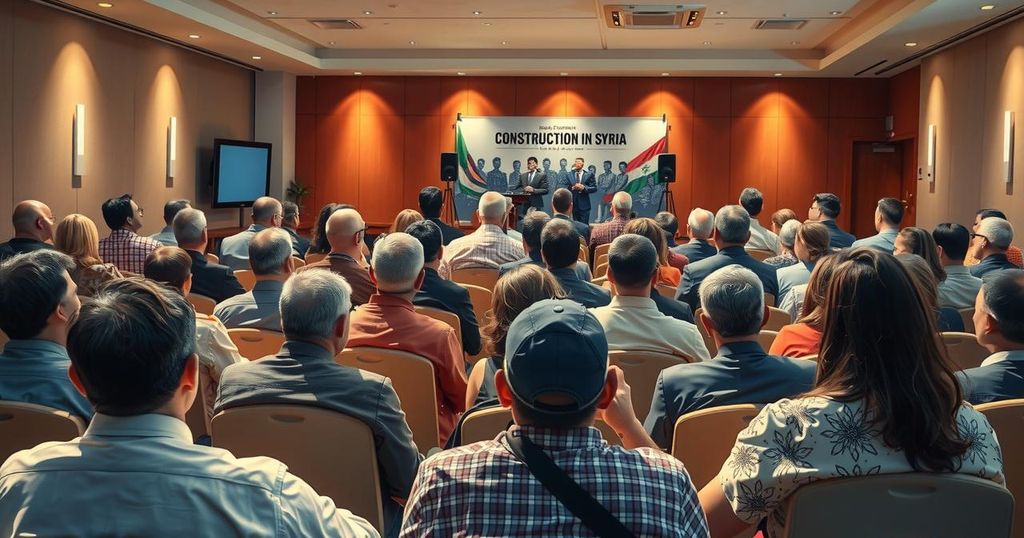Weiser Diplomacy Center Discusses Syrian Reconstruction Challenges and Hope
The Weiser Diplomacy Center hosted a talk on post-civil war reconstruction in Syria, featuring Qutaiba Idlbi and Dr. Abdalmajid Katranji. Focused on the impact of the civil war and the new leadership under Ahmed al-Sharaa, they discussed the challenges of rebuilding, the brain drain phenomenon, and the importance of effective governance in aid efforts. They called for U.S. involvement and the reassessment of sanctions affecting recovery.
The University of Michigan’s Weiser Diplomacy Center recently hosted a talk featuring Qutaiba Idlbi and Dr. Abdalmajid Katranji, focusing on the societal reconstruction in Syria following 14 years of civil war. The session addressed the political landscape following the regime change from Bashar al-Assad to Ahmed al-Sharaa, who now leads amidst ongoing challenges in rebuilding the war-torn nation.
Idlbi discussed the vast destruction caused by the civil war, noting a significant brain drain where many educated Syrians have fled the country. He highlighted, “There’s a lot for Syrians to rebuild; half of Syria has left the country,” underscoring the immense challenges facing those who remain. Despite this, he acknowledged that many Syrians are hopeful for a new beginning free from the past regime’s authoritarianism.
The new leadership under Sharaa has received scrutiny for alleged ties to Al-Qaeda. However, both speakers defended him by stating that he has disassociated from such groups and now focuses on combating extremism. Katranji shared insights on humanitarian efforts in Idlib, highlighting the development of local governance and civil society vital for reconstruction, contrasting these with his experiences in Assad-controlled regions.
Katranji noted, “There was structure, there were institutions and that’s what’s critical to understand,” emphasizing the contrast in governance quality between Idlib and Assad’s territories, where aid efforts faced bureaucratic hurdles. Furthermore, Idlbi explained how the protracted conflict inadvertently allowed for the emergence of self-governing institutions, an opportunity not afforded under previous regimes.
Idlbi expressed optimism towards U.S. involvement in Syria, advocating for support without imposing directives, believing, “They have built the Syrian Dream, which I believe is very similar to the American Dream.” Katranji also critiqued U.S. sanctions under the Caesar Syria Civilian Protection Act, advocating for their removal to facilitate recovery and expressing that “if you wait too long, then another vacuum will be created.”
Katranji emphasized the urgency of lifting these sanctions, noting the global shift towards relaxing them by organizations such as the European Union and the United Nations, which he stated could benefit the reconstruction efforts significantly. The event concluded with a call from students, notably from Students Organize for Syria, for increased awareness and accurate reporting on Syria’s status.
In summary, the Weiser Diplomacy Center’s event shed light on the complexities of post-civil war Syria, highlighting the challenges and opportunities for reconstruction in the wake of significant upheaval. The conversation reaffirmed the hope that Syrian society is rebuilding itself, supported by informed international assistance, while also advocating for the immediate reconsideration of sanctions that may hinder these efforts.
Original Source: www.michigandaily.com




Post Comment